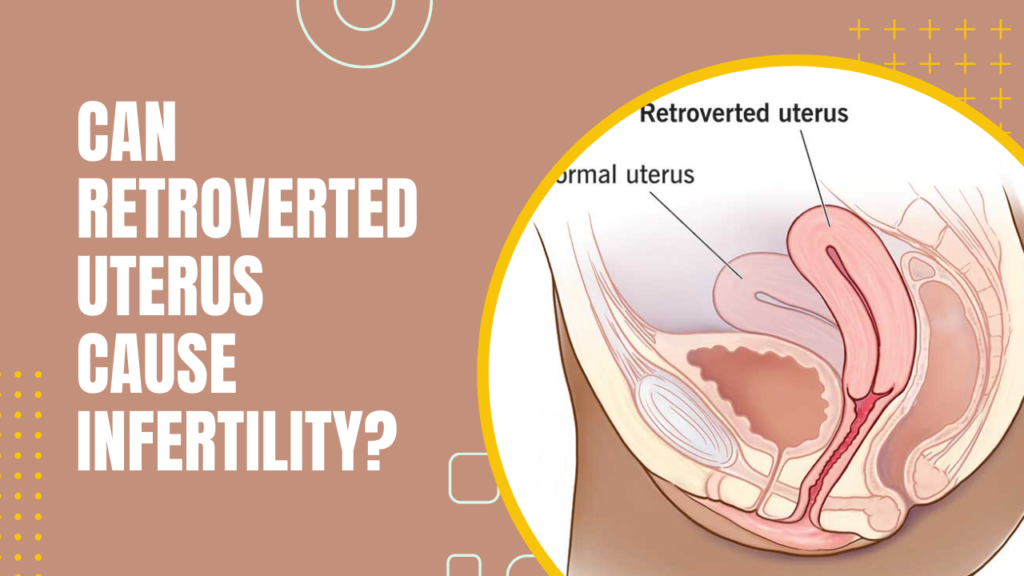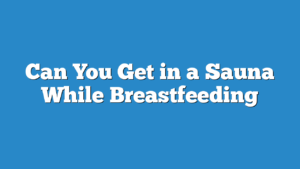Are you struggling to conceive and wondering if your retroverted uterus is to blame? You’re not alone. Many women with this condition experience difficulty getting pregnant and may be concerned about their fertility. But can a retroverted uterus really cause infertility? To answer this question, we consulted with experts who have conducted proven studies on the topic.
First, let’s define a retroverted uterus. This condition, also known as a tipped or tilted uterus, occurs when the uterus is tilted backwards instead of forwards towards the bladder. It’s estimated that about 20% of women have a retroverted uterus, and it’s typically a harmless condition that doesn’t require treatment.
However, for some women, a retroverted uterus may cause discomfort during sex, menstrual periods, or pregnancy, and may impact their ability to conceive. If you’re concerned about your fertility and have a retroverted uterus, read on to learn more about the potential causes and treatment options available.
Understanding Retroverted Uterus
If you’re wondering whether a retroverted uterus could affect your fertility, it’s important to understand what exactly a retroverted uterus is and how it can impact your reproductive health.
A retroverted uterus, also known as a tilted or tipped uterus, is a condition where the uterus is tilted backwards instead of forwards. This is a very common condition, with approximately 1 in 4 women having a retroverted uterus.
Having a retroverted uterus does not necessarily cause any symptoms or health problems. However, in some cases, it can lead to discomfort during sex, painful periods, or difficulty inserting a tampon.
In order to diagnose a retroverted uterus, your doctor will perform a pelvic exam and may use an imaging test such as an ultrasound to confirm the diagnosis.
Overall, understanding retroverted uterus is an important first step in determining whether it could be impacting your fertility. While the condition itself does not necessarily cause infertility, it is important to be aware of any symptoms or complications that may be associated with it.
By working closely with your healthcare provider and seeking appropriate treatment if necessary, you can help ensure that your reproductive health is optimized and that you have the best chance of achieving a healthy pregnancy.
Fertility and Retroverted Uterus
Did you know that the position of your uterus could affect your chances of getting pregnant? If you have a retroverted uterus, you might be wondering if it could cause infertility. The good news is that having a retroverted uterus doesn’t necessarily mean that you won’t be able to conceive. However, there are some factors that could potentially make it more difficult to get pregnant.
One of the possible causes of infertility in women with a retroverted uterus is endometriosis. This condition occurs when the tissue that normally lines the inside of your uterus grows outside of it, causing pain and sometimes infertility. Another possible cause is pelvic inflammatory disease, which can cause scarring in the fallopian tubes and make it difficult for the egg to travel to the uterus. However, it’s important to note that not all women with a retroverted uterus will experience these conditions.
If you’re trying to conceive and have a retroverted uterus, there are some treatment options available. In some cases, your doctor may recommend a procedure called a uterine suspension, which involves attaching the uterus to the abdominal wall to keep it in a forward position. This can help increase your chances of getting pregnant. Additionally, fertility treatments like in vitro fertilization (IVF) or intrauterine insemination (IUI) may also be an option. Talk to your doctor about your options, and they can help you decide on the best course of action for your individual situation.
Causes of Infertility in Women with Retroverted Uterus
You may be wondering why it’s challenging for you to get pregnant, especially if you have a tilted uterus. One of the causes of infertility in women with a retroverted uterus is hormonal imbalances. Hormonal imbalances can affect the regularity of your menstrual cycle, making it difficult for you to conceive. Additionally, a hormonal imbalance can cause problems with the development of the egg, making it difficult for fertilization to occur.
Another cause of infertility in women with a retroverted uterus is pelvic inflammatory disease (PID). PID is an infection of the reproductive organs that can cause scarring and damage to the fallopian tubes, making it difficult for the egg to travel to the uterus for fertilization.
Women with a retroverted uterus are at a higher risk of developing PID, which can lead to infertility. A retroverted uterus can cause infertility in women due to hormonal imbalances and pelvic inflammatory disease.
If you are struggling to conceive and have a tilted uterus, it’s important to consult with your healthcare provider to determine the underlying cause of your infertility. With proper treatment and management, many women with a retroverted uterus can go on to have successful pregnancies.
Expert Opinions on Retroverted Uterus and Infertility
Understanding the opinions of medical professionals can provide valuable insight into the challenges and potential solutions for conceiving with a tilted womb. According to Dr. Karen Leham, a board-certified obstetrician and gynecologist, there’s no evidence to suggest that a retroverted uterus causes infertility. While there may be other underlying factors contributing to infertility, such as endometriosis or pelvic inflammatory disease, the position of the uterus alone isn’t a significant factor.
However, some evidence suggests that a retroverted uterus may impact pregnancy success rates. In a study published in the Journal of Obstetrics and Gynaecology, researchers found that women with a retroverted uterus had a slightly higher risk of early pregnancy loss in the first trimester. The study also found that women with a retroverted uterus were more likely to require a cesarean section delivery.
While these findings should not cause undue concern, they do highlight the importance of monitoring pregnancy carefully in women with a retroverted uterus diagnosis.
While a retroverted uterus is not considered a significant factor in infertility, it may have some impact on pregnancy success rates. If you’ve been diagnosed with a retroverted uterus and are struggling to conceive, it’s important to work closely with your healthcare provider to identify any underlying factors that may be contributing to infertility. With the right treatment and support, many women with a retroverted uterus are able to conceive and have successful pregnancies.
Treatment Options for Infertility in Women with Retroverted Uterus
There are several effective treatment options available for women struggling with conception and a tilted womb. One of the most common options is a procedure called uterine suspension, which involves repositioning the uterus to a more natural position. This can be done using laparoscopic surgery, which is minimally invasive and has a high success rate.
Another option is in vitro fertilization (IVF), which involves retrieving eggs from the ovaries and fertilizing them with sperm in a laboratory. The resulting embryos are then transferred to the uterus. IVF has a higher success rate than uterine suspension, but it is also more expensive and can be emotionally stressful for women undergoing the procedure.
Coping with emotional distress during treatment is an important aspect of infertility treatment. Women with a retroverted uterus may feel frustrated and overwhelmed by their struggle to conceive. It’s important to seek support from loved ones and to consider joining a support group for women with infertility. Counseling and therapy can also be helpful in coping with the emotional toll of infertility and treatment.
Lifestyle and Dietary Changes to Improve Fertility
Now that you know about the treatment options for infertility in women with retroverted uterus, it’s time to focus on improving your chances of conceiving. Improving fertility can be a long process, but it’s worth it in the end.
Making lifestyle and dietary changes can help you get closer to your goal of starting a family. Firstly, you should start by focusing on your diet. Eating a balanced diet that’s rich in fruits, vegetables, and whole grains can help improve your fertility. Incorporating foods that are high in antioxidants, such as blueberries and spinach, can also improve your chances of conceiving. Additionally, drinking plenty of water and reducing your intake of caffeine and alcohol can help improve your overall health and fertility.
Aside from dietary changes, making lifestyle changes can also help improve your fertility. Exercising regularly and maintaining a healthy weight can help regulate your menstrual cycle and improve your chances of getting pregnant. Reducing stress levels and practicing relaxation techniques can also help improve your fertility. Finally, avoiding smoking and secondhand smoke can help improve your overall reproductive health.
Improving fertility is a process that involves making lifestyle and dietary changes. By focusing on your diet, making lifestyle changes, and avoiding harmful habits, you can improve your chances of getting pregnant. Remember, it’s important to be patient and consistent with these changes, as it may take time to see results. With dedication and perseverance, you can increase your chances of starting a family.
- Incorporate an unordered 4 item bullet list in markdown format to create imagery in the audience’s mind.
- Eating a balanced diet rich in fruits, vegetables, and whole grains
- Incorporating foods that are high in antioxidants, such as blueberries and spinach
- Exercising regularly and maintaining a healthy weight
- Reducing stress levels and practicing relaxation techniques
- Getting enough sleep and establishing a consistent sleep schedule.
Alternative and Complementary Therapies
If you’re looking for alternative and complementary therapies to improve your fertility, there are a few options to consider. Acupuncture and massage therapy have been shown to help reduce stress and improve blood flow to the reproductive organs.
Herbal remedies and traditional medicine, such as Ayurveda and Traditional Chinese Medicine, may also provide benefits in improving fertility.
Acupuncture and Massage Therapy
Acupuncture and massage therapy have been studied as potential treatments for infertility caused by retroverted uterus. These alternative therapies are believed to help improve blood flow to the uterus, reduce inflammation, and promote relaxation.
Here are some of the benefits of acupuncture and massage therapy for retroverted uterus infertility:
- Acupuncture benefits:
- Stimulates blood flow to the uterus and ovaries
- Regulates the menstrual cycle
- Reduces stress and anxiety
- Massage therapy techniques:
- Improves blood circulation to the uterus
- Reduces pelvic pain and inflammation
- Promotes relaxation and reduces stress
While these therapies may not be a cure-all for infertility caused by retroverted uterus, they can be beneficial as part of a holistic approach to fertility treatment. It’s important to consult with a licensed acupuncturist or massage therapist who specializes in fertility to determine the best approach for your individual needs.
Herbal Remedies and Traditional Medicine
You may have heard of using herbal remedies and traditional therapies to address your fertility concerns. While there’s limited scientific evidence to support their effectiveness, some people believe that these remedies can help improve fertility.
Some herbs that are commonly used for fertility include chasteberry, evening primrose oil, and red clover. These herbs are believed to help regulate hormones and promote ovulation.
Traditional therapies, such as Ayurveda and Traditional Chinese Medicine, also offer remedies for infertility. These therapies focus on restoring balance to the body and improving overall health. Treatments may include acupuncture, dietary changes, and herbal remedies.
While these therapies may not work for everyone, they’ve been used for centuries and may offer a holistic approach to improving fertility. It’s important to speak with a healthcare provider before trying any herbal remedies or traditional therapies to ensure they’re safe and appropriate for you.
Coping with Infertility and Seeking Emotional Support
Dealing with infertility can be emotionally draining, but seeking support from loved ones and professionals can help make the journey more manageable.
Infertility support groups can be a great resource for those struggling with infertility. These groups provide a safe space for individuals to share their experiences, emotions, and fears with others who understand what they’re going through. It can be comforting to know that you’re not alone in your struggles and that there are others who are going through similar experiences.
Another way to cope with infertility is to seek emotional support from a therapist or counselor. Infertility can take a toll on your mental health, and it’s important to prioritize your emotional well-being during this time. A therapist can provide you with coping strategies, help you navigate the difficult emotions that come with infertility, and provide a non-judgmental space for you to process your feelings.
Lastly, it’s important to take care of yourself during this challenging time. Make sure to prioritize self-care activities that bring you joy and help you relax. This can include things like exercise, meditation, or spending time with loved ones. It’s important to remember that infertility doesn’t define you and that there’s more to life than just having a baby. Taking care of your emotional well-being is essential in order to navigate the challenges of infertility and come out stronger on the other side.
Prevention and Management of Retroverted Uterus
Managing a retroverted uterus can be achieved through exercises and positions that help alleviate discomfort during intercourse. One of the most effective ways to manage the condition is through yoga practice. Yoga helps to stretch and strengthen the pelvic muscles, which can help to reposition the uterus over time. Specific poses like the Bridge Pose, Cobra Pose, and Fish Pose are excellent for targeting the pelvic region and reducing tension.
Pelvic floor exercises are also highly recommended for managing a retroverted uterus. These exercises are designed to strengthen the pelvic floor muscles, which support the uterus and bladder. Simple exercises like Kegels can be done anywhere, and they help to improve blood flow to the pelvic region, reduce cramping, and increase sexual pleasure. Additionally, using a pelvic floor exerciser can help to improve muscle tone and alleviate discomfort.
In addition to exercise, certain positions during intercourse can also help to alleviate discomfort and improve fertility. Positions like the missionary, spooning, and doggy style can help to reduce pressure on the uterus and increase the chances of conception. By incorporating these exercises and positions into your daily routine, you can effectively manage a retroverted uterus and improve your overall reproductive health.
| Exercise | Description | Benefits | ||
|---|---|---|---|---|
| Bridge Pose | Lie on your back with knees bent, feet flat on the ground. Lift hips up towards the ceiling while keeping feet and shoulders on the ground. | Stretches and strengthens pelvic muscles, improves blood flow to pelvic region | ||
| Cobra Pose | Lie on your stomach with hands under shoulders. Push up with hands, lifting chest and head off the ground. | Stretches pelvic muscles, reduces tension and cramping | ||
| Kegels | Contract and hold the muscles used to stop urine flow for 10-15 seconds, then release. Repeat several times a day. | Strengthens pelvic floor muscles, improves muscle tone and sexual pleasure | Kegels can also be helpful for preventing and treating urinary incontinence. |
Frequently Asked Questions
Can a retroverted uterus be corrected without surgery?
Yes, non-surgical treatments such as physical therapy can effectively correct a retroverted uterus. With regular exercises and pelvic floor strengthening, you can improve the position of your uterus and alleviate any associated symptoms.
Is it possible to get pregnant with a retroverted uterus?
Wondering if it’s possible to conceive with a retroverted uterus? Retroverted uterus and fertility: Myth or Reality? Understanding the causes and treatment options for retroverted uterus and infertility. Consult with a healthcare provider to discuss your individual situation.
Can a retroverted uterus cause painful intercourse?
If you have a retroverted uterus, it is possible to experience painful intercourse. Managing discomfort may include using lubrication, different positions, or pelvic floor exercises. Understanding the causes may involve exploring the link between endometriosis and retroverted uterus.
Are there any exercises that can help with a retroverted uterus?
To improve symptoms of a retroverted uterus, try pelvic floor exercises and yoga stretches. These can help strengthen the muscles in your pelvic area and alleviate discomfort. Consult with your healthcare provider before starting any exercise regimen.
Is there a higher risk of miscarriage with a retroverted uterus?
If you have a retroverted uterus, there may be a slightly higher risk of miscarriage, but it’s not a major concern. The impact of retroversion on fertility is also minimal, so don’t worry too much about it affecting your pregnancy outcomes.
Conclusion
So, can a retroverted uterus cause infertility? It may increase the risk of fertility issues, but it isn’t always a direct cause.
There are many factors that can contribute to infertility, and a retroverted uterus is just one of them. It’s important to talk to your doctor if you’re struggling to conceive, as they can help identify any underlying issues and recommend treatment options.
If you have a retroverted uterus, there are still many things you can do to improve your chances of getting pregnant. From making lifestyle changes to seeking alternative therapies, there are many options available.
Remember to take care of yourself emotionally as well, as infertility can be a difficult and emotional journey. With the right support and care, you can increase your chances of conceiving and starting a family.


